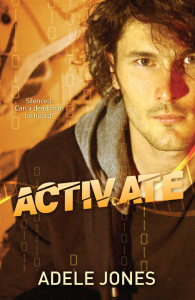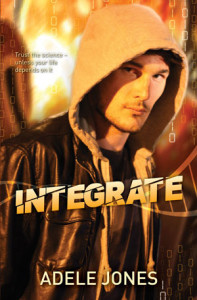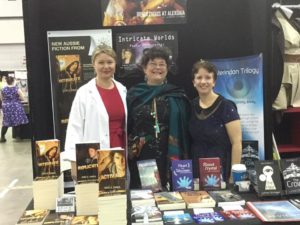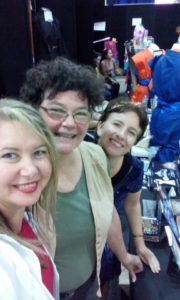December last year I got to share details of my new book Activate on the ‘Just Write for Kids’ #InterviewByBook blog. This was such a fun interview. I thought I’d repost it on my site so those of you who missed it could enjoy it too. For all those who write for children and young adults, make sure you pop over to the ‘Just Write for Kids’ site for some great resources on kids lit.
#InterviewByBook with Adele Jones
Posted on December 28, 2016 by Just Write For Kids
 Title: Activate
Title: Activate
Author: Adele Jones
Illustrator: N/A
Publisher: Rhiza Press (YA/Adult imprint of Aussie children’s publisher Wombat Books)
Genre: Techno-crime thriller
Age Group: Young adult (13+)
Please tell us a bit of what your book is about.
Activate is the final book in the Blaine Colton trilogy. The teenage hero, Blaine, is a survivor of a genetic disorder, thanks to some pretty cool gene therapy. Activate begins with Blaine living a secret life to protect him from enemies he’s made in the previous two novels. He’s lonely, unwell, and over being isolated from his friends and family, so he decides to ‘bend’ the rules … just a little. Things rapidly tumble out of control, leaving Blaine in a desperate situation. Will he survive? Will justice be served? Well, you’ll have to read the novel to find out. 😉
What kinds of themes / issues are raised in this story?
The underpinning theme of the trilogy is ‘What determines the measure of a person’s worth?’ These novels perhaps ask more questions than they answer, but by experiencing the world through Blaine’s eyes, readers are encouraged to consider issues relating to bioethics and intellectual property, disability, adoption, faith, values, self-worth, loss and relationships (family, friends and romantic).
How are these important to you in raising awareness to your readers?
Although Blaine’s background may be different to ours, in life we all face personal challenges that require us to decide many of these issues for ourselves. These themes are interconnected, and I think the significance of this becomes clearer as Blaine tackles obstacles from corrupt medical researchers, members of an international crime syndicate, to his own failing body. Previously, he’s been unable to decide most things for himself, his illness forcing him to be entirely reliant on the choices, actions and opinions of others. Finally he can choose for himself, but with that choosing comes the weight of responsibility and the realisation that even if life isn’t perfect, you’ve got to make the most of the opportunities you have.
Who or what inspired you to write this story?
The premise ‘what if science could’ was sparked by a discussion with a friend about the illness of a member of their family. When every question was answered with ‘it’s complicated’ I couldn’t help investigating the disease for myself. With a background in science, my mind kept tumbling around the information I’d learned about mitochondrial disease (and there’s always more being discovered), until the outline for Integrate came together. I wasn’t writing the story about the young man who sparked the initial conversation, and had invented a fictional ‘different from what’s been seen before’ scenario for Blaine, but I also wanted to acknowledge his contribution. With the blessing of his family I placed an acknowledgement in the front of the first novel, from which the trilogy grew.
What is your favourite part of the book?
Oh, that’s hard! Blaine’s such a cool character to write. He’s got a healthy dose of teenage attitude and independence, and a good sense of humour, even though life hasn’t been easy for him. In such a fast-paced story with so many facets, I don’t know if can narrow down a very favourite part of the story, sorry.
How would you describe the publishing process? Were they supportive? How long did it take?
Rhiza Press have been wonderful throughout the publication process. Given this was the third in the trilogy with a definite release date one year after Replicate, the process was a little different to the first two novels. I had a clear timeline of when each stage needed to be completed, and Rhiza’s very reliable when it comes to dates. I did have a little ‘oh my goodness’ moment when I realised the publisher’s key assistant-cum-internal editor was going away to Europe smack bang during the finalisation of the manuscript, but we got there—well ahead of schedule, in fact.
What was the collaboration like between author and illustrator?
Juicy gossip, please! Given I don’t have illustrations, I’m going to defer to cover design. I was very fortunate to have a handsome young man (who happened to fit Blaine’s features fantastically) model for the cover. The photo shoot team are a great bunch and we had lots of fun getting the images. Rhiza browsed the photos from the shoot, selecting the one they felt best suited their requirements, before doing the graphics work on it. (All the pretty bits.)
What has the feedback / audience response been like so far?
I’ve been holding my breath since the novel’s release. Replicate was very well received, but it also had a cliff hanger ending. (Cue ‘hurry up and get the next book out’ mail.) I even had some readers who wouldn’t read Replicate until they knew Activate was available. Given how popular Replicate had been, I felt a little anxious over how Activate would be received, especially as the story has quite a different feel for very plausible reasons relating to the plot. Thus far the reviews have been very positive. (Phew!)
What teaching and learning ideas would you suggest to complement this book? 
Integrate has found its way into a few high schools as a class novel, and it has quite inclusive teaching notes supporting it. I’m still working on the notes for Replicate and will begin Activate’s once these are done. A lot of the exercises in the Integrate notes relate to the themes and values (ethics, IP, disability, self-worth etc) presented through the novel, particularly Blaine’s situation and the motivation of those vying for ownership over his ultimate outcome. Given the common themes across the books, many activities in the Integrate notes could relate to all three novels.
I’ve pasted an activity from the notes below. This one’s often used in psychology applications and I sometimes include a variation of this as part of my characterisation workshops.
At the top of a fresh page ask students to write the heading, ‘I am …’ In one or two minutes have them write down as many things as they can in response to this prompt. At the end have students: – Mark each statement as positive, negative or neutral.
– Ask, ‘If I [teacher] were to collect and read these lists, what would it tell me about you?’ (self-esteem, body image, relationships, etc)
– Ask, ‘If the lists were to be read aloud, is there anything you would change?’
– Ask students to consider their ratings (+ve, -ve, neutral) and reflect on why they’ve assigned them to the respective statements.
– Can they identify any overarching themes?
Do you have a book trailer for your book?
Please share. Only for Integrate, unfortunately. (I’ll put the link here, but am hoping to have ones for Replicate and Activate in the near future.)
Any details on your book launch you’d like to tell us about?
The book launch was held at our local library and was lots of fun. It involved questions about bedpans, kissing people with beards and making a face on a balloon using the hands of someone else (who couldn’t see what they were doing). All relevant activities. (Truly, they were.) Oh, and we had readings, some Q&A about the novel, book signings and a hearty morning tea brought together by my amazing ‘Quirky Quills’ writing group.
Please let us know where we can find more on you and your book.
My website is: www.adelejonesauthor.com
Rhiza’s website is: http://rhizapress.com/activate
Activate on Goodreads: https://www.goodreads.com/book/show/31498997-activate
And don’t forget good ol’ Dr Google ‘Adele Jones Blaine Colton’
Thanks for sharing your story, Activate, with us, Adele!
 Adele Jones is a Queensland based, award winning author. She writes young adult and historical novels, poems, inspirational non-fiction and fiction short works, along with juggling family responsibilities and a ‘real job’ in the field of science. Her first YA novel ‘Integrate’ was awarded the 2013 CALEB Prize for unpublished manuscript. Her writing explores issues of social justice, humanity, faith, natural beauty and meaning in life’s journey, and as a speaker she seeks present a practical and encouraging message by drawing on these themes. For more visit www.adelejonesauthor.com or contact[@]adelejonesauthor.com
Adele Jones is a Queensland based, award winning author. She writes young adult and historical novels, poems, inspirational non-fiction and fiction short works, along with juggling family responsibilities and a ‘real job’ in the field of science. Her first YA novel ‘Integrate’ was awarded the 2013 CALEB Prize for unpublished manuscript. Her writing explores issues of social justice, humanity, faith, natural beauty and meaning in life’s journey, and as a speaker she seeks present a practical and encouraging message by drawing on these themes. For more visit www.adelejonesauthor.com or contact[@]adelejonesauthor.com
#InterviewByBook
 Did you know I’m a self-confessed science geek? If you’ve met me, I’m pretty sure you do. In fact, it becomes a little obvious when you read my near-science fiction trilogy (science-based speculative fiction that feels like it could happen now in our modern world) and my current WIP, which is a science fantasy time-slip parallel narrative. What may surprise you is that there have been times I’ve been at reader-writer events and felt like a fish out of water.
Did you know I’m a self-confessed science geek? If you’ve met me, I’m pretty sure you do. In fact, it becomes a little obvious when you read my near-science fiction trilogy (science-based speculative fiction that feels like it could happen now in our modern world) and my current WIP, which is a science fantasy time-slip parallel narrative. What may surprise you is that there have been times I’ve been at reader-writer events and felt like a fish out of water.




